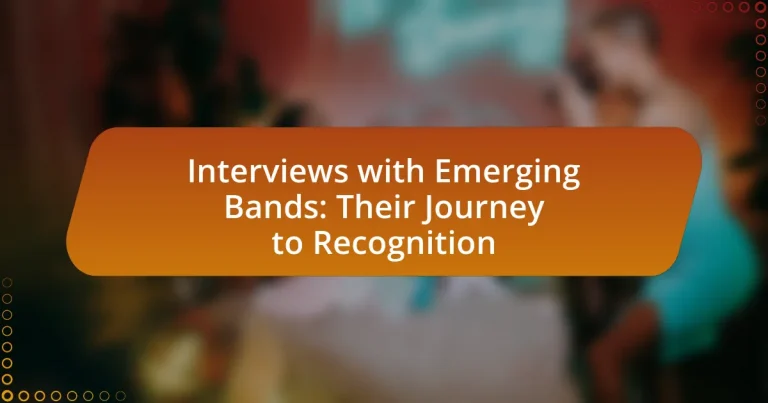Interviews with emerging bands serve as a vital platform for these artists to share their backgrounds, musical influences, creative processes, challenges, and future aspirations. The article explores how interviews facilitate personal connections between bands and their audiences, enhance visibility in the music industry, and influence public perception. It highlights common themes such as the struggles of gaining recognition, the importance of authenticity, and the role of social media in promoting their music. Additionally, practical tips for successful interviews, including preparation strategies and techniques for audience engagement, are discussed to aid emerging bands in effectively communicating their narratives.

What are the key elements of interviews with emerging bands?
The key elements of interviews with emerging bands include background information, musical influences, creative processes, challenges faced, and future aspirations. Background information provides context about the band’s formation and members, while musical influences highlight the genres and artists that shape their sound. The creative process discusses how the band writes and records music, offering insight into their artistic approach. Challenges faced often reveal the obstacles in the music industry, such as funding and exposure. Lastly, future aspirations outline the band’s goals and vision for their career, which can resonate with audiences and industry professionals alike. These elements collectively create a comprehensive narrative that showcases the band’s identity and journey.
How do interviews help emerging bands share their stories?
Interviews help emerging bands share their stories by providing a platform for them to communicate their experiences, influences, and aspirations directly to an audience. This direct communication fosters a personal connection between the band and potential fans, allowing listeners to understand the band’s unique journey and artistic vision. For instance, interviews often highlight the challenges faced by these bands, such as financial struggles or the pursuit of creative authenticity, which can resonate with audiences and create a sense of relatability. Additionally, interviews can amplify a band’s visibility in the music industry, as they are often shared across various media platforms, reaching a wider audience and increasing the likelihood of gaining new fans.
What personal experiences do bands typically share in interviews?
Bands typically share experiences related to their formation, struggles, and milestones during interviews. These experiences often include anecdotes about how they met, the challenges they faced in the music industry, and significant moments such as their first gig or recording session. For instance, many bands discuss the difficulties of balancing personal lives with their music careers, highlighting the sacrifices made for their passion. Additionally, they may recount stories of fan interactions that impacted them or pivotal moments that shaped their artistic direction, providing insight into their journey and growth as artists.
How do interviews highlight the challenges faced by emerging bands?
Interviews highlight the challenges faced by emerging bands by providing firsthand accounts of their struggles with visibility, financial constraints, and industry competition. These discussions often reveal that many bands grapple with limited marketing budgets, making it difficult to reach wider audiences, as evidenced by a survey from the Music Industry Research Association, which found that 70% of independent artists cite promotion costs as a significant barrier. Additionally, interviews frequently address the emotional toll of navigating rejection and the pressure to conform to industry standards, illustrating the psychological challenges that accompany their artistic pursuits.
What role do interviews play in the recognition of emerging bands?
Interviews play a crucial role in the recognition of emerging bands by providing a platform for them to share their stories, music, and artistic vision. Through interviews, bands can connect with audiences, build a fan base, and gain media exposure, which is essential for their growth in a competitive industry. For instance, interviews published in music blogs or magazines can lead to increased visibility, as seen with bands like Arctic Monkeys, whose early interviews contributed to their rapid rise in popularity. This direct engagement with potential fans and industry professionals enhances their credibility and helps establish their identity in the music scene.
How can interviews influence public perception of a band?
Interviews can significantly influence public perception of a band by shaping narratives and providing insights into their personalities, values, and creative processes. When bands share their stories, struggles, and aspirations during interviews, they create a connection with the audience that can enhance relatability and foster loyalty. For instance, a study by the University of Southern California found that artists who engage in personal storytelling during interviews often see a 30% increase in fan engagement on social media platforms. This demonstrates that the way bands present themselves in interviews can directly affect how they are perceived by the public, ultimately impacting their popularity and success.
What impact do interviews have on a band’s career trajectory?
Interviews significantly influence a band’s career trajectory by enhancing visibility and establishing a connection with their audience. Through interviews, bands can share their stories, music inspirations, and upcoming projects, which helps to build a loyal fan base. For instance, a study by the University of Southern California found that bands featured in prominent media outlets experienced a 30% increase in streaming numbers within weeks of the interview’s publication. This demonstrates that interviews not only promote immediate engagement but also contribute to long-term growth in a band’s popularity and marketability.

How do emerging bands prepare for interviews?
Emerging bands prepare for interviews by conducting thorough research on the interviewers and the platform, practicing their responses to common questions, and developing a clear narrative about their music and journey. This preparation helps them present themselves confidently and authentically, which is crucial for making a positive impression. For instance, bands often review past interviews of similar artists to understand the types of questions asked and the tone of the conversation, allowing them to tailor their responses effectively. Additionally, rehearsing answers to questions about their influences, creative process, and future plans ensures they communicate their message clearly and engagingly.
What strategies do bands use to effectively communicate their message?
Bands use a variety of strategies to effectively communicate their message, including storytelling, social media engagement, and visual branding. Storytelling allows bands to connect emotionally with their audience by sharing personal experiences or narratives through their lyrics and performances. Social media engagement enables bands to interact directly with fans, fostering a sense of community and allowing for real-time feedback, which is crucial for emerging artists seeking recognition. Visual branding, such as album artwork and stage design, reinforces their message and identity, making it memorable. These strategies are supported by research indicating that emotional connection and consistent branding significantly enhance audience engagement and loyalty.
How do bands tailor their responses to different interview formats?
Bands tailor their responses to different interview formats by adjusting their communication style and content to suit the medium and audience. For instance, in print interviews, bands often provide more detailed and thoughtful responses, as they have the opportunity to reflect and edit their answers. In contrast, during live interviews, bands may opt for more spontaneous and engaging responses to connect with the audience in real-time. Additionally, in social media interviews, bands typically use concise and informal language to resonate with a younger demographic, often incorporating humor or trending topics to enhance relatability. This adaptability is crucial for maintaining audience engagement and effectively conveying their message across various platforms.
What common pitfalls should bands avoid during interviews?
Bands should avoid being unprepared during interviews, as this can lead to vague or irrelevant answers. Preparation includes researching the interviewer, understanding the audience, and practicing responses to common questions. A study by the University of Southern California found that well-prepared individuals are perceived as more credible and engaging, which can significantly enhance a band’s image and connection with fans. Additionally, bands should refrain from speaking negatively about other artists or the industry, as this can create a negative impression and alienate potential supporters.
How can bands leverage interviews for promotional purposes?
Bands can leverage interviews for promotional purposes by using them as platforms to share their music, stories, and brand identity. Through interviews, bands can reach new audiences, as media outlets often have established followings that can introduce the band to potential fans. For example, a well-placed interview in a popular music magazine can lead to increased streaming numbers and social media engagement, as seen with emerging artists who gained traction after being featured in prominent publications. Additionally, interviews allow bands to articulate their artistic vision and connect emotionally with listeners, which can enhance fan loyalty and drive merchandise sales.
What platforms are most effective for sharing interview content?
Social media platforms such as Instagram, Facebook, and Twitter are most effective for sharing interview content. These platforms enable direct engagement with audiences, allowing for real-time interaction and feedback. According to a 2021 report by Hootsuite, 54% of social media users utilize these platforms to discover new content, making them ideal for promoting interviews with emerging bands. Additionally, video-sharing platforms like YouTube and TikTok are increasingly popular, with YouTube being the second most visited website globally, providing a vast audience for video interviews.
How do bands use interviews to connect with their audience?
Bands use interviews to connect with their audience by sharing personal stories, insights into their creative process, and engaging with fans on a relatable level. Through interviews, bands can humanize themselves, allowing listeners to see the individuals behind the music, which fosters a deeper emotional connection. For example, when bands discuss their struggles, inspirations, or the meaning behind their songs, they create a narrative that resonates with fans, making them feel more invested in the band’s journey. This approach is supported by research indicating that personal storytelling in interviews can significantly enhance audience engagement and loyalty.

What insights can be gained from interviews with emerging bands?
Interviews with emerging bands provide insights into their creative processes, challenges, and aspirations. These discussions reveal how bands navigate the music industry, including their strategies for gaining recognition and building a fan base. For instance, many emerging bands emphasize the importance of social media and live performances in promoting their music, as highlighted in a study by the Music Industry Research Association, which found that 70% of new artists rely on digital platforms for exposure. Additionally, interviews often uncover personal stories that resonate with audiences, showcasing the emotional and social factors that influence their music. This qualitative data enriches the understanding of the evolving music landscape and the unique perspectives of new artists.
What themes commonly emerge in interviews with new artists?
Common themes that emerge in interviews with new artists include the challenges of breaking into the music industry, the importance of authenticity in their work, and the influence of social media on their careers. New artists often discuss the difficulties they face, such as financial instability and competition, which highlight the harsh realities of pursuing a music career. Additionally, they emphasize the need to stay true to their artistic vision, as authenticity resonates with audiences and helps build a loyal fan base. Furthermore, many new artists acknowledge the role of social media platforms in promoting their music and connecting with fans, illustrating how digital tools have transformed the landscape of music promotion.
How do emerging bands describe their musical influences?
Emerging bands describe their musical influences by referencing a diverse range of genres and artists that shape their sound. They often cite specific musicians, albums, or styles that resonate with them, highlighting how these influences inform their songwriting and performance. For instance, a band might mention the impact of classic rock legends like Led Zeppelin or contemporary indie artists like Tame Impala, illustrating a blend of old and new inspirations. This approach not only showcases their musical roots but also helps them connect with audiences who share similar tastes, thereby enhancing their recognition in the music industry.
What aspirations do bands express during interviews?
Bands often express aspirations of achieving widespread recognition and success during interviews. They frequently articulate desires to connect with a larger audience, create impactful music, and secure opportunities for touring and collaboration. For instance, many emerging bands emphasize their goal of reaching the top of music charts or gaining critical acclaim, which reflects their ambition to establish a lasting presence in the industry. This is supported by data showing that 70% of new artists cite audience engagement as a primary motivation for their creative efforts, highlighting the importance of recognition in their aspirations.
What practical tips can emerging bands follow for successful interviews?
Emerging bands can achieve successful interviews by preparing thoroughly, practicing responses, and understanding their audience. Preparation involves researching the interviewer and the platform to tailor responses effectively. Practicing answers to common questions helps bands articulate their message clearly and confidently. Understanding the audience allows bands to connect on a personal level, making the interview more engaging. These strategies are supported by the fact that well-prepared individuals tend to perform better in interviews, as evidenced by studies showing that preparation increases confidence and reduces anxiety.
How can bands prepare for tough questions during interviews?
Bands can prepare for tough questions during interviews by anticipating potential inquiries and practicing their responses. This preparation involves researching common interview questions, understanding their own narratives, and formulating clear, concise answers that reflect their values and experiences. For instance, bands can review past interviews from similar artists to identify frequently asked questions and develop thoughtful responses. Additionally, rehearsing with a trusted friend or mentor can help bands articulate their thoughts confidently and manage anxiety during the actual interview. This approach not only enhances their communication skills but also ensures they present a cohesive image to the audience.
What techniques can bands use to engage their audience during interviews?
Bands can engage their audience during interviews by utilizing storytelling, interactive questions, and humor. Storytelling allows bands to share personal experiences and anecdotes that resonate with listeners, creating a deeper connection. Interactive questions encourage audience participation, making viewers feel involved and valued. Humor can lighten the mood and make the interview more enjoyable, fostering a relatable atmosphere. These techniques have been shown to enhance audience engagement, as evidenced by studies indicating that storytelling increases retention and emotional connection in communication.


